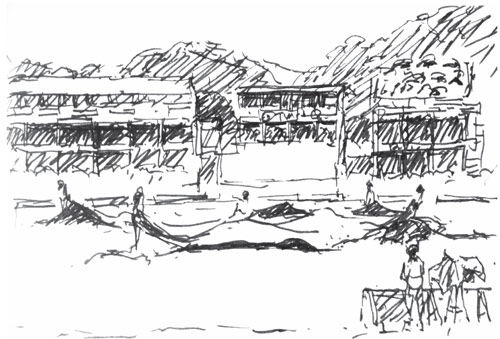 |
 |
 |
|
March 2015 |
Rebuilding West Indies cricket has been the heart of discussions surrounding the sport for two decades. I think we have reached the point where we have to turn our back on cricket, in a manner of speaking, in order to truly help it. I suggest that we step away a bit so we can better understand what truly ails it. We need to see cricket as part of the larger community of sports, and we need to place that entire community within the context of a society. What has been happening within cricket is essentially what is happening throughout our societies. So what are we really trying to rebuild? It is about reshaping a culture that has evolved over a relatively short time. Nobody will argue that the Caribbean has been dealing with downwardly spiralling societies. Many of our societal problems are fuelled by declining standards, discarded values and failed leadership. I am sure a diligent sociologist can track the declines and show a correlation between the enterprises of building societies and building cricket. If we narrow our focus to the cricket and continue to isolate its current pathetic state to a list of narrowly defined ills, then whatever desire we have to improve it, will always be fruitless. The people who run cricket, the people who play it, the youngsters coming up within its precincts, they are all creatures of our society. Not one of them comes to cricket with a clean slate. They all carry the imprints and conditioning of their pasts. The cricket we play is configured by more than technical ability. Indeed, what has made the game one of such potential magnificence is its capacity to be shaped by the quality of the minds at play. The greatest periods of world cricket have been those when its players possessed sharp, critical, intellects to support their technical competencies. Think about it. We have had many technical interventions in 20 years, coaches and clinics galore, but we still have not seen the kind of consistency that professional players ought to manifest. We’ve seen enough of our players play like a dream on occasion and then haunt us like nightmares for the better part of a season. Why is that? They do not lack ability.
And we cannot make any headway with rebuilding our cricket if we do not see our roles in its collapse. We have to see it as a joint responsibility to fix it by addressing our attention and efforts at the way we live, the way we conduct ourselves and the values we uphold and transmit. We have to start fixing homes, schools and civic society if we are to fix cricket. Deryck Murray has spoken about his time on the West Indies team and how it earned world respect, and the way players felt about their role as ambassadors. In Mr. Murray’s time, no real support came from the West Indies Cricket Board. He once said that as far as the Board was concerned, talented cricketers dropped off trees and there was no need to invest in developing them. But the cricketers were part of a different culture. For young men growing up in often impoverished environments with little social advantages or prospects, cricket was one of the ways in which a man could define his masculinity. He could be recognized if he was good, and because there was so much talent out there, he had to be very good, and then he had to stay at that level or he could lose his place. It was also about proving that the West Indian could be as good as anyone else – and with the colonial past lurking so close behind, these fellows were still walking in its long shadows. Those times are gone, and the fierce pride that was evoked because men had to prove themselves against those kinds of forces, has given way to another dubious definition of masculinity. Our women’s team may now be undergoing a similar journey of proving themselves, and that might be one factor in how purposefully they are cultivating that culture of champions. But with regard to the men, we have aided and abetted the development of a culture which elevates consumerism, applauds anarchy, touts disrespectful behaviour as the mark of the man, and reduces decency to the hallmark of a wimp. Whereas a sound education was the way to elevate oneself, now all you need is a gun and some bling. Changing that culture calls for leaders who are unafraid to take measures that go against the status quo; leaders who dare to invest in measures that will take time to bear fruit, and leaders who are willing to work with and not against the people behind them. There is a concept called emotional intelligence that psychologists love. Basically, its components are self-awareness, self-regulation, motivation, empathy and social skill. Good leaders, they argue, are those who are emotionally intelligent – and this has been one of the failings of our leaders. “All across the Caribbean there is sickening evidence of patently corrupt, inept, or dysfunctional Governmental administrations on the one hand, and powerless and distraught citizenries on the other hand,” wrote Barbadian David Commissiong recently as he itemized examples up and down the region, and tried to incite people power to arrest the decline. Is it that we are powerless, or have we retreated to such a state of apathy that we can no longer discern the strength we, as citizens, have to shape our own destinies? Strikingly, as the West Indies Cricket Board edges towards the election of president and vice president, with the incumbent, Jamaican Dave Cameron and Barbadian Joel Garner vying for the top spot, the Jamaican Cricket Association reversed its plan to support Garner and have indicated support for Cameron. Cameron has exposed the leanness of his mind with the tasteless re-tweet on Chris Gayle that he has since apologised for; will it change anyone’s vote? (See Tony Cozier’s column on the elections.) If it is treated as a one-off slip and not an insight into the working of his mind, then all of the WICB directors should pack up and go away. Fortunately, Gayle’s response was a record-breaking 215 in the World Cup match against Zimbabwe; so much more civilized it was. But it is the way of leadership in the region and in that sense, cricket cannot be treated as an isolated sore on a pristine body that only needs a topical application to heal it and return it to a pristine state. Cricket fails when we are failing. It is as simple as that. |



 What is missing is precisely the elements that have dwindled away from our societies: respect, values, commitment, discipline and sad to say, the ability to think.
What is missing is precisely the elements that have dwindled away from our societies: respect, values, commitment, discipline and sad to say, the ability to think.